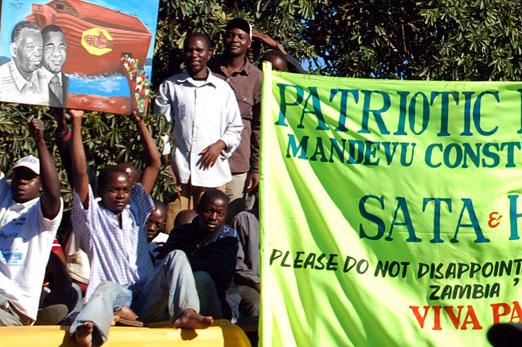Zambia Election briefing 2011: Battle of the Dinosaurs – By Giacomo Macola and Jack Hogan

 Incumbent Zambian President Rupiah Banda faces an uphill battle to retain the position he inherited in 2008 from the late Patrick L. Mwanawasa. Despite presiding over a sustained process of socio-economic growth (Zambia’s GDP increased at an average rate of about 6.5% over the course of the past three years), Mr. Banda has been unable to retain the electoral support enjoyed by his predecessor.
Incumbent Zambian President Rupiah Banda faces an uphill battle to retain the position he inherited in 2008 from the late Patrick L. Mwanawasa. Despite presiding over a sustained process of socio-economic growth (Zambia’s GDP increased at an average rate of about 6.5% over the course of the past three years), Mr. Banda has been unable to retain the electoral support enjoyed by his predecessor.
In the general elections of 2006, Mr. Mwanawasa won the presidential race with a comfortable 43%, as against the 29% of his closest rival, Patriotic Front’s Michael Sata. Mwanawasa’s performance proved sufficient to give his party, the Movement for Multi-Party Democracy (MMD), a workable parliamentary majority. Two years later, in the presidential by-election rendered necessary by the death in office of Mwanawasa, the gap between Banda and Sata narrowed down to a mere 2% (ca. 35,000 votes out of a total of 1,791,000). The signs are that the forthcoming elections – scheduled for 20 September – will be a similarly neck and neck affair.
Banda’s unpopularity is especially marked among the underclasses of the capital, Lusaka, and the Copperbelt, the country’s industrial heartland. The predicament of the 74-year-old Banda has much to do with the inequitable distribution of the social costs of privatization and with his perceived “˜softness’ on corruption – against which Mwanawasa waged a very public, if only partly successful, war. Equally significant, however, has been Banda’s incapacity to establish a firm control over the MMD, Zambia’s ruling party, into which he was co-opted by Mwanwasa following a long career in UNIP, Zambia’s party-state until the fall of Kaunda in 1991 and the return to multi-partyism. Under Banda, the MMD has experienced several setbacks and defections by top national leaders, including some former cabinet ministers and, most symbolically, Mwanawasa’s own son, Patrick. In general, these have worked to the advantage of Sata’s Patriotic Front (PF), thereby threatening to sap such benefits of incumbency as any African ruling party must be expected to enjoy.
Born in the same year as Banda, the charismatic Michael Sata (aka “˜King Cobra’) is no less a political dinosaur than Zambia’s current president. A former governor of Lusaka during Kaunda’s dictatorship and close ally of disgraced late Republican President Frederick Chiluba – whose ill-fated unconstitutional third-term bid Sata supported in 2001 – this one-time colonial policeman and most opportunistic of politicians has been able to turn his PF, over which he rules with an iron fist, into a genuine political force. What he appears to have less of a hold over are his party’s policies, which are characterized by extreme flexibility, if not outright inconsistency. Only recently, for instance, did Sata tone down his hostility towards Chinese investors and admiration for Zimbabwean president Mugabe.
His crude brand of populism, drawing on both nationalist rhetoric and less outdated anti-globalisation discourse, has been shown to strike a chord with disaffected urbanites and also with Bemba speakers in his ethnic hinterlands, the Northern and Luapula Provinces. Sata’s victory in Lusaka and the populous Copperbelt towns – where the MMD is fielding a set of generally weak parliamentary candidates – appears certain. If the MMD is to stand a chance of retaining the presidency, it will have to maximize its share of the vote in the countryside, where a series of good agricultural years and Banda’s sustained policy of social investment (dozens of new clinics and schools have been recently inaugurated) might still persuade the electorate to vote in favour of continuity.
In parts of the country, however, Banda’s likely rural vote will have to be shared with the third major presidential candidate, Hakainde Hichilema, the leader of the United Party for National Development (UPND). A wealthy businessman, Hichilema hails from Zambia’s one-time “˜granary’, the Southern Province, which his party has dominated since its first electoral showing in 2001. As a Tonga-speaking leader, Hichilema inherits a long tradition of political opposition, dating back to the pre-Independence era, when the Southern Province (unlike most other areas of the country) rejected Kaunda’s UNIP, remaining loyal to Zambia’s first nationalist party, Harry Nkumbula’s ANC.
It is highly likely that Hichilema’s agenda, informed by the Province’s traditionally agrarian concerns, will prove sufficient to carry the day in his home region and some surrounding or ethnically affiliated constituencies. Twenty-five years younger than his rivals, Hichilema has youth on his side. On the other hand, quite apart from Africa’s gerontocratic leanings, his electorate’s perceived “˜tribalism’ (itself the result of decades of political marginalization) will in all likelihood militate against a repeat of the electoral performance of 2001, when the then UPND’s candidate, the late Anderson Mazoka, came within roughly 35,000 votes of wresting the presidency from the MMD.
In the absence of reliable opinion polls, and given the disturbing partisanship of both private and government-owned media, the outcome of the forthcoming presidential and parliamentary elections remains too close to call. With sections of the international community showing signs of uneasiness about the prospect of a Sata victory (the spectre of Bingu wa Mutharika, Malawi’s current disastrous incumbent, is just round the corner), some informed Zambian analysts (and the Economist Intelligence Unit as well) predict a tight Banda victory in the presidential race and a split or PF-dominated parliament. In this latter scenario, it is not unrealistic to hypothesize the stipulation of a post-electoral, anti-Sata pact between the MMD and the UPND.
Since 2001, electoral contests in Zambia have been fierce and dirty, but altogether peaceful. It is unclear whether political violence will play a more prominent role in the current campaign than it did in the past. In light of ongoing concerns about the impartiality of the Electoral Commission of Zambia, it is possible that Sata will refuse to bow down to defeat. Concerned observers can only hope that the fundamental decency of the Zambian electorate will once more prevail over the inflammatory rhetoric of some of its leaders.
Giacomo Macola is Lecturer in African History, University of Kent at Canterbury and Jack Hogan is PhD candidate, University of Kent at Canterbury





[…] on the 2008 elections which should spark a few thoughts on what may be different next week. Zambia Election Briefing 2011: Battle Of The Dinosaurs – By Giacomo Macola And Jack Hoga. Perhaps the best assessment so far on the pending elections. Giacomo Macola is the author of the […]
[…] out African Arguments for a brief […]
Very thoughtful,well summerised
Your analysis is spot on, but your nerve fails at the conclusive moment. Fact 1: 2001 election result – Sata = 3.4%; Fact 2: 2006 election result – Sata = 29.37%; Fact 3: 2008 election result – Sata = 38.64%; (Not-so-) Speculative guess: 2011 election result for Sata > 40%. I am not voting for him, but you cannot escape reality: Sata is more popular now than he was in 2008. RB benefited from sympathy vote for Levy Mwanawasa in 2008. It is HIGHLY unlikely that RB, on his own steam, will get anything like the 40% he ‘got’ in 2008. Prediction: 1. All minor candidates put together <= 10% of vote; 2. HH = 15%; 3. RB = ~32 +/- 2%; 4. Sata = 43 +/- 2%. For the MMD to conjure up another 'win' by rigging will be too difficult this time, because of the large margin of Sata's genuine victory. Sata's problem will be one of managing expectations, and to avoid looking vindictive and petty in his attempts to dismantle the MMD for its years of corruption, however well intentioned. Then the Zambia's job will be to ensure that his party rules for one term only. Uphill battles all round: Much caginess and mistrust between the ruled and the ruler throughout the five years. Sata's health will not hold up under all this stress. Constitutional issues within 3 years.